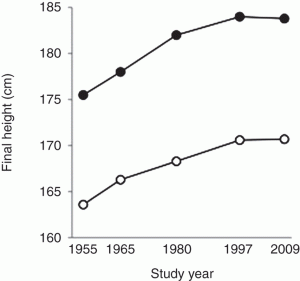Height and heart attack: genetic determinism is still wrong
From the Herald (originally from the Independent)
Short people are at a greater risk of heart attack – and there’s little they can do about it because the link is genetic.
This one is partly the fault of the researchers and partly the fault of the journalists. The press release says
“We have shown that the association between shorter height and higher risk of coronary heart disease is a primary relationship and is not due to confounding factors such as nutrition or poor socioeconomic conditions.”
That’s partly true, and new and interesting, but (a) it’s being oversold (“the” association?) and (b) even if it were completely true, it wouldn’t imply the “there’s little they can do about it” added by the journalists.
Taking the second point first: knowing that something has a genetic component tells you absolutely nothing about how easy or hard it is to change. At a biological level hair colour and eye colour have similar degrees of genetic influence, but one of them is very easy to change and the other is more difficult and inconvenient.
Also, it’s certainly not true that height is entirely genetically determined. There is a genetic component: tall people have tall children. There is also an environmental component: most people are taller than their grandparents. Here’s a graph (source) showing how the heights of Dutch people changed over sixty years: the Dutch went from some of the shortest people in Europe to some of the tallest, and this was an environmental change, not a genetic change.
The research paper doesn’t even claim that among modern Westerners the association between height and heart attack risk is all genetic, though if you only have the press release you have to read carefully to avoid getting that impression. Even within the (fairly homogeneous) groups of people being studied, the genetic variants they used explain only about 10% of the variation in height.
What’s new in this research is that some of the relationship between height and heart attack risk is genetic. Until now, it was possible that all the association was explained by environmental factors in childhood or before birth that made people shorter and also, separately, increased their heart attack risk.
For the part of the relationship explained by genetic variation there are basically three possible sorts of explanation:
- Being short has some direct biological effect on risk, for example, smaller people have smaller blood vessels, which might get blocked by smaller blood clots.
- Being short subjects you to different environmental risks: for example, if shorter people had lower incomes (on average) they might have higher risk for various social and lifestyle reasons
- The genetic variants that make you shorter also have some separate effect on heart attack risk: for example, the same variant might affect growth in infancy and also affect diabetes risk in later life.
These are all interesting, and there’s a reasonable hope of being able to separate them out with more data and experiments.
The last sentence of the research paper is a good counterpoint to the media coverage
More generally, our findings underscore the complexity underlying the inherited component of CAD.
[Disclosure: I work with one of the cohorts that is part of one of the consortia that is part of the whole Cardiogram group and I know some of the researchers — but that would be true of anyone in the field]
Thomas Lumley (@tslumley) is Professor of Biostatistics at the University of Auckland. His research interests include semiparametric models, survey sampling, statistical computing, foundations of statistics, and whatever methodological problems his medical collaborators come up with. He also blogs at Biased and Inefficient See all posts by Thomas Lumley »
